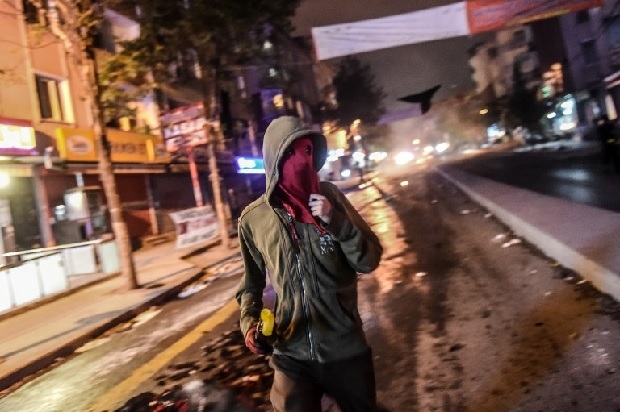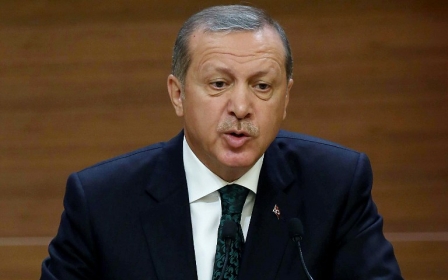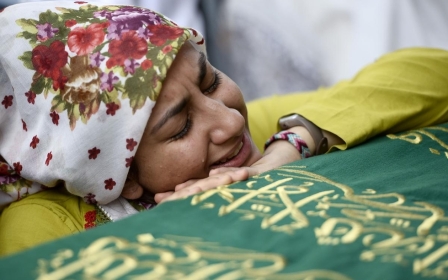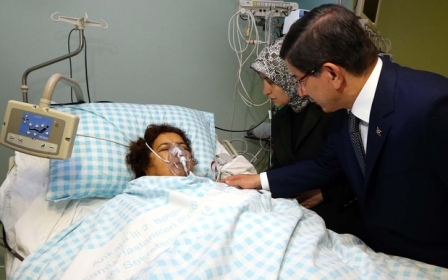ANALYSIS: Massive Turkey bombing fails to unite polarised political camps

ISTANBUL - Even the worst attack in Turkey’s history that left more than 100 civilians dead in the capital Ankara has failed to unite highly polarised political camps and seen the continuation of the blame game and finger-pointing.
The attack on 10 October that is being attributed to the Islamic State (IS) group, and which targeted a gathering of Kurdish and left-leaning activists who were protesting the ongoing violence between the state and the Kurdistan Workers’ Party (PKK) has shaken the country to its core, but has also seen various political camps become even more entrenched in their positions in the run-in to a crucial re-election slated for 1 November.
The only thing all camps seem to agree on is that it is unlikely to affect the holding of elections and its outcome.
Opposition parties and critics hold the government responsible for allowing such an attack to occur and even accuse it of collusion in some shape or form. Government supporters say this is an attack on all of Turkey and part of a domestic and international campaign to drag the country down.
The attack near Ankara’s train station was the third major blow to the country since June when a crucial general election was held and one that deprived the AKP of forming a majority government for the first time in more than a decade. Since the June election Turkey has become involved in a fight on two fronts. One against the PKK in northern Iraq and Turkey, and the other against IS in Syria.
Concerted campaign
Burhan Kayaturk, the member of parliament from the ranks of the Justice and Development Party (AKP) representing the predominantly Kurdish-populated southeastern province of Van, believes the attack is just the latest move in an international and domestic plot aimed at bringing down Turkish President Recep Tayyip Erdogan and stopping Turkey’s rise to the international stage.
“This attack is the latest move in a concerted campaign to erode AKP votes and target our democracy. But at the moment this is our secondary concern. Our primary concern is the well-being of our citizens and our grief at the loss of so many lives,” Kayaturk told Middle East Eye.
Nuray Mert, a political scientist and newspaper columnist who is a fierce critic of the government, however, holds the view that a government that has been in sole power for the past 13 years needs to be held accountable for this absolute failure in providing public security.
“Who else do you hold responsible for such a failure? Especially when they have been in full control of all state mechanisms for the past 13 years,” Mert said.
“The opposition is letting the government off the hook here by placing blanket blame on the vague concept called the state rather than asking more precise questions, and thereby allowing the government to deny responsibility and get away with it,” she told MEE.
Intelligence failure
Mert is sceptical of the government’s repeated claims of doing all it can to prevent such atrocities and says it is unfathomable for a country which she asserts has basically been turned into a police state run by an intelligence network to be unable to prevent such an atrocity in the heart of the country’s capital.
“It is strange that a group like IS, which is very open about its ideology and claims immediate credit for all its actions everywhere else decides to be so secretive about its actions in Turkey and refrains from claiming responsibility,” she said.
Turkey has seen three major attacks of this kind since June and all have targeted Kurdish and left-wing groups. The first was at a Peoples’ Democratic Party (HDP) election rally in June, followed by a suicide bombing of a group of volunteers preparing to aid the rebuilding the Syrian town of Kobane, and the latest one was on 10 October next to the railway station in Ankara.
“Given what we know of IS ideology it seems like pretty flimsy logic to say Kurdish groups are being targeted in Turkey because the forces of the Kurdish Democratic Union Party (PYD) are fighting them in Syria. A more natural target for IS in Turkey would be nightclubs and mixed gender spaces where secular lifestyles are prevalent,” said Mert.
Scandalous claims
Kayaturk is furious at insinuations that the AKP might in any way be involved in such atrocities and says that not only are the prime minister and president very pious Muslims who follow one of the basic tenets of Islam, which state that the taking of a single innocent life equates to the killing of all humanity, but that it is not even in the party’s interest to go down that particular path.
“Let’s assume the prime minister and president are cruel and evil men. They would still look to protect their interests. The Diyarbakir blast before the 7 June election led to the HDP increasing its vote share by up to three percent. Why would they encourage such an action at this point knowing the consequences,” said Kayaturk.
There is simply no way that the government, prime minister or president supported such attacks or even ignored such threats, according to Kayaturk.
“The party, prime minister and president have never ever expected to benefit from terrorism and never will. Turkey is fighting a lone battle in the region against all terrorist threats, both domestic and international; but has been abandoned by its global allies in this fight,” he said.
Mert, on the other hand, says despite it being an open secret that various IS-affiliated groups are actively present in various parts of the country it is shocking that no real and concrete official action has been taken.
“Any prime minister who is even half serious should be embarrassed when saying they have taken all the requisite action in response to the attacks in the border town of Suruc and will do so in regard to the attack in Ankara.”
In line with the general belief prevalent among all political actors on the Turkish scene, Mert and Kayaturk only seem to be united in the single belief that elections will go ahead as planned and that there is unlikely to be any radical shift in the result, even if it represents completely different things to all parties concerned.
“Our hope and belief is that Turkey will not be affected and will continue on its democratic path focused on human rights,” said Kayaturk, while Mert is of the opinion that despite the political situation being so fluid where predicting events even a week ahead is difficult, “there is unlikely to be any serious change given the entrenched positions of all parties”.
New MEE newsletter: Jerusalem Dispatch
Sign up to get the latest insights and analysis on Israel-Palestine, alongside Turkey Unpacked and other MEE newsletters
Middle East Eye delivers independent and unrivalled coverage and analysis of the Middle East, North Africa and beyond. To learn more about republishing this content and the associated fees, please fill out this form. More about MEE can be found here.




